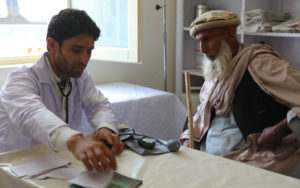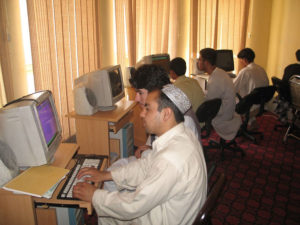 Headquartered in The Hague, Netherlands, the international development aid organization Cordaid helps people in vulnerable regions and post-conflict zones build self-reliant, thriving communities. Cordaid was formed in 2000 by a merger of several existing Dutch relief organizations—the oldest of which originated to aid European refugees during World War I—and it has more than 100 years of experience delivering assistance to people living in situations of poverty, instability, and social exclusion. Currently, Cordaid facilitates projects in 41 countries around the world and maintains field offices in 12 of these, including Afghanistan.
Headquartered in The Hague, Netherlands, the international development aid organization Cordaid helps people in vulnerable regions and post-conflict zones build self-reliant, thriving communities. Cordaid was formed in 2000 by a merger of several existing Dutch relief organizations—the oldest of which originated to aid European refugees during World War I—and it has more than 100 years of experience delivering assistance to people living in situations of poverty, instability, and social exclusion. Currently, Cordaid facilitates projects in 41 countries around the world and maintains field offices in 12 of these, including Afghanistan.
Working in collaboration with over 600 local implementation partners, Cordaid shares its skills and resources to enable sustainable programs in a broad array of focus areas, ranging from economic opportunity and education to health care and security. Each of its partners possesses deep connections to its community, extensive knowledge of the local social and political context, and proven capabilities in one of Cordaid’s focus areas. Together, these partners constitute a culturally and operationally diverse set of organizations, all of which embrace Cordaid’s commitment to empowering community-based initiatives that have the potential to achieve positive social change in the lives of people living in fragile circumstances.
Meeting Diverse Needs in Afghanistan’s Provinces

Image courtesy ResoluteSupportMedia | Flickr
For the past 15 years, Cordaid has been actively engaged in Afghanistan. Its central focus since 2011 has been the Conflict Transformation program, through which Cordaid helps Afghan partner organizations evaluate and address local problems and advocate for national and international policies that promote the best interests of the affected communities. With a wide scope that covers health care, food security, and livelihood projects, the Conflict Transformation program provides 100,000 Afghans with access to medical services and provides 120,000 small agricultural producers with the resources to increase their yields.
Given the complicated circumstances created by ongoing conflict in Afghanistan, Cordaid believes it can have the greatest impact through in-depth projects that target the varied needs specific to different provinces. In Parwan and Balkh, for instance, Cordaid delivers instruction in agricultural techniques, while in Kabul, activities focus on health care and counseling for people who have been displaced by conflict. The bonds of trust its partner organizations have forged with local communities have allowed productive efforts in health services and medical training to be mounted in some of Afghanistan’s most insecure provinces, including Kandahar, Uruzgan, and Nangarhar.
Considered altogether, the work of Cordaid and its local partners has reached provinces all across the country and assisted Afghans in areas as diverse as disaster response and peace education. An incomplete but more concrete impression of the impact made by these efforts can be gleaned from a brief review of a few of the numerous Cordaid projects in Afghanistan.
Improving Vocational Training in Maidan Wardak

Image courtesy ILO in Asia and the Pacific | Flickr
In response to an appeal from the Afghanistan Ministry of Education, Cordaid partnered with the Dutch foundation SchoolSupport4Afghanistan to help improve education at a technical school in Maidan Wardak province. The school was established in 2011, and prior to the initiation of the Cordaid project in early 2014, it suffered from a lack of machinery and insufficiently trained teachers. Now better equipped, the school will allow students in Maidan Wardak to receive quality technical education locally, and avoid the burdensome travel and expense of taking classes in Kabul.
Cordaid and SchoolSupport4Afghanistan addressed this need by financing and organizing the provision of machinery, educational materials, and teacher training. High-grade, durable equipment unavailable from suppliers within Afghanistan and the surrounding region was procured from European manufacturers and shipped overseas. With project coordination carried out by the Technical and Vocational Education and Training Institute in Kabul, the Maidan Wardak instructors learned the skills required to teach students how to operate and maintain the machinery.
Now that the school is better equipped, its 15 teachers provide vocational training in metalworking, electrical engineering, and automotive engineering to 189 students each year.
Pairing Food Aid with Reconstruction in Communities Affected by Flood
Springtime flash floods often hit the mountainous central regions of Afghanistan, and in May 2015, rapidly rising waters in the Miramoor, Khider, and Shahristan districts of Dai Kundi province swept away fertile soil, wrecked orchards, and caused serious damage to homes, roads, walls, and irrigation canals. The destruction left local residents in dire need of food and clean, potable water, and farmers in want of assistance with clearing land and rebuilding village infrastructure.
By cooperating with its partner Organization of Human Welfare (OHW), Cordaid organized a food-for-work project to resolve both the food security and reconstruction issues facing communities affected by the floods. More than 300 households selected as beneficiaries by OHW, community development councils, and the local government received mixed food packages of rice, flour, and oil, as well as emergency health and hygiene kits and awareness education in safe water treatment practices. All beneficiaries accepted the aid on agreement to contribute 22 days of work removing debris from the fields and repairing houses, canals, and other damaged structures.
Though primarily implemented as a disaster relief intervention, the food-for-work project enabled Dai Kundi residents to restore their villages and farmland by their own efforts, rather than simply providing them with essential items of immediate need. By working with people affected by disasters to repair their homes and agricultural infrastructure, such projects reach beyond temporary relief and establish a sustainable solution to local food security.

